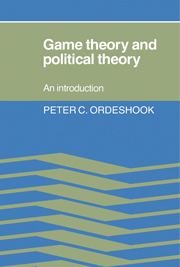Book contents
- Frontmatter
- Contents
- Preface
- Acknowledgments
- 1 Individual preference and individual choice
- 2 Individual preference and social choice
- 3 Basic theory of noncooperative games
- 4 Elections and two-person zero-sum games
- 5 Nonzero-sum games: political economy, public goods, and the prisoners' dilemma
- 6 Institutions, strategic voting, and agendas
- 7 Cooperative games and the characteristic function
- 8 The core
- 9 Solution theory
- 10 Repeated games and information: some research frontiers
- References and a guide to the literature
- Index
9 - Solution theory
Published online by Cambridge University Press: 21 March 2010
- Frontmatter
- Contents
- Preface
- Acknowledgments
- 1 Individual preference and individual choice
- 2 Individual preference and social choice
- 3 Basic theory of noncooperative games
- 4 Elections and two-person zero-sum games
- 5 Nonzero-sum games: political economy, public goods, and the prisoners' dilemma
- 6 Institutions, strategic voting, and agendas
- 7 Cooperative games and the characteristic function
- 8 The core
- 9 Solution theory
- 10 Repeated games and information: some research frontiers
- References and a guide to the literature
- Index
Summary
That cooperative situations might not have a natural equilibrium such as the one that the core defines came as no surprise to game theorists. The first solution concept proposed, the V-set or stable set, was designed specifically to treat games without a natural equilibrium. Although it is easy to criticize this concept today with the more than 30 years of hindsight since its invention, it adopted a perspective that departs significantly from the way in which we commonly think about political outcomes. Much of political science explains events as the result of specific actions and prior conditions. Nature may intervene to cast a probabilistic sheet over events, and our predictions may not be unique, as when two equally good alternatives exist, but each prediction contains its own logic. A specific n-tuple of strategies is a Nash equilibrium because no one has a unilateral incentive to defect from it, and an outcome is in the core because it is undominated. And although nonunique equilibrium strategies or core outcomes imply some degree of predictive indeterminacy, it is tempting to infer that we can reduce all other indeterminacies by supplying more detail to a situation's description. The toss of a coin, analogously, might not be random if we measure precisely its initial velocity, spin, and so forth. Hence, we might suppose that if we refine the measurement of people's preferences and perceptions, and if we describe strategic alternatives in more detail, then political events would seem to follow a more deterministic logic as well.
The theory that this chapter examines questions this view and suggests that it may be impossible often to narrow predictions about outcomes beyond subsets of possibilities.
Information
- Type
- Chapter
- Information
- Game Theory and Political TheoryAn Introduction, pp. 387 - 440Publisher: Cambridge University PressPrint publication year: 1986
Accessibility standard: Unknown
- 1
- Cited by
